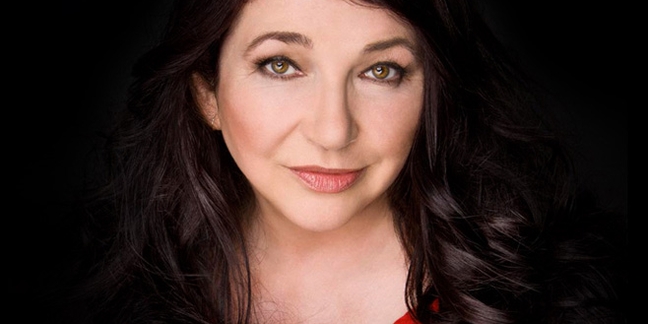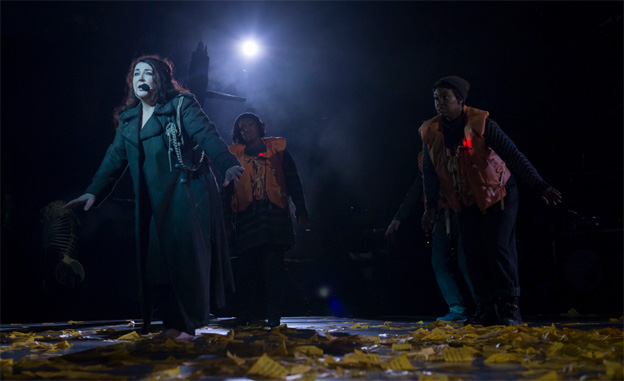
Live Review: Kate Bush’s First Show in 35 Years

Before the dawn, let’s go back 35 years. “The Kate Bush show that’s been wowin’ ‘em is a tribute to… the old-style ideology that defines the relationship between artist and audience as purely that between worshipper and worshipped,” wrote NME‘s Charles Shaar Murray of Bush’s first tour in 1979, during the aftermath of England’s punk heyday. He continued in this vein; he wasn’t a fan. “The Kate Bush experience is an exercise in the time-honored art of battering an audience to death and making them like it.”
Popular memory now records Kate Bush’s Tour of Life as a high watermark for the live rock experience, an extravaganza of song, dance, and mime featuring headset microphone innovation (bow down, Madonna) and a stylized womb-egg (take that, Gaga). Perhaps unsurprisingly, the whirling dervish behind it was considered an anomaly during punk, her work being about imagination and detail rather than crude, simple style. By 1985′s Hounds of Love, though, she was a globally successful icon who had mastered a wide-eyed brand of art-pop while turning songs about nuclear war from the point of a foetus (“Breathing”), dead soldiers from the perspective of a bereaved mother (“Army Dreamers”), and the restless search for knowledge by feckless humans (“Sat in Your Lap”) into UK Top 20 hits.
There are other bits of Murray’s review that won’t find favor today, but his points about idolatry and excess ring true on the opening night of Bush’s 22-date Before the Dawn run at London’s Hammersmith Apollo. Fans scream at the stage before the show starts, and when the lights go up, they whoop like a soccer crowd. When Bush appears, there is barely any oxygen left. This is a Second Coming, all right.
But this gig is about more than a night out: It’s about what one woman’s return means, what it represents. Born within a month of Madonna and Michael Jackson, Bush remains a rare female embodiment of complete creative control, something she established when the music business was a proper business. She was the first woman to write and perform a British #1 (“Wuthering Heights”) and have a British #1 album (Never for Ever), and she’s also produced her own work since 1982′s The Dreaming. She still defines her career, resolutely, on her own terms, but this doesn’t mean it’s not right to gawp at her uncritically—although tonight’s gig is a great one, it isn’t perfect.
Before the Dawn begins with “Lily”, from 1993′s The Red Shoes. Everything else aside, Bush’s presence alone is surreally moving. Here is a 56-year-old woman who looks like a 56-year-old woman, in a long black coat, black hair trailing down her back, singing to us. She doesn’t look like an idol at all. There’ll be too much discussion about her beauty, of course—Robert Plant, an artist similarly sexual in his younger years, and on his own path, never gets that now—but it is wonderful that she looks as she does on the stage. This isn’t kowtowing to convention, after all. This is mum doing whatever the hell she wants.
Nevertheless, the start of the show underwhelms. The first seven songs of the set are delivered simply and plainly, Bush’s band lining up conventionally behind her. A mixture of hits (“Hounds of Love”, “Running Up That Hill”) and album tracks (“Joanni”, “Never Be Mine”) shimmer out one by one, lit diamonds in a stage set sparkling in basic configurations. The biggest shock is her 16-year-old son, Bertie, being pointed out in the backing singers. The band, and Bush’s voice, also wobble at points; her singing is definitely not note-perfect tonight, despite what others have said. Nevertheless, it remains a lovely, special thing, like a whisper up the spine, especially over the high notes in “Top of the City”. It’s just enough to carry this opening section, which lacks theatrical weight.
Then comes the “wind whistling” during “King of the Mountain”, and—bang—everything goes crazy. The band’s drummer is suddenly stage-front and spotlit, swinging a rope. Smoke and yellow paper fly out from guns on the stage. The paper features the poem on which The Ninth Wave—the suite of songs on Hounds of Love‘s second side—was based. You realize the first seven songs were a MacGuffin, an elaborate ruse. The effect is jolting and astonishing.
 From The Ninth Wave section of last night’s show. Photo by Ken McKay. Copyright Noble and Brite.
From The Ninth Wave section of last night’s show. Photo by Ken McKay. Copyright Noble and Brite.
What follows is the greatest part of the show, as the story of a woman lost at sea is brought to dramatic life. Projections of waves toss and surge on a screen, as do heavier ones, on the stage floor, wrought in fabric. The set is like a whale’s mouth, huge teeth bending in, with a back projection of our girl in her lifejacket. Dancers in strange steampunk costumes menace the stage; at the end of the set, they carry Bush away in tragic and terrifying fashion.
Then there’s a man phoning the coastguard, and Bush’s husband and son in their living room, arguing about dad burning the dinner. This set-piece begins embarrassingly, before taking another dramatic turn: Bush turning up behind the door, unseen, in black, like a ghost. What would happen if she was lost, we all wonder, as her stunning songs, performed stunningly, ram this message home. It’s an incredible half hour.
The second half of the show is given to a lesser-known suite: A Sky of Honey, from 2005′s Aerial, about the progress of a perfect summer’s day. The stage concept is similarly ambitious: A wooden boy mannequin, manipulated by a man dressed in black, is trapped in a strange place, before something happens to him—there is the suggestion of blood, pain, and dramatic light. There is a narrative about mothers and sons here, which packs a proper punch, but Bertie Bush is also here again playing a painter. His presence, especially when he’s singing, feels rather heavy-handed, and as the other songs aren’t particularly strong, this part lags. Maybe too much son, mum. It’s OK though. Kate Bush is only human.
And her humanity is what we should all love her for, anyway—for helping to turn a spirit of restless invention and emotion into a music industry touchstone, for translating high art, high thinking, and her huge heart into catchy, hooky modern pop music. The two-song encore that sends us on our way shows us that knack in excelsis: “Among Angels”, from 2011′s 50 Words for Snow, played by Bush, perfectly, alone on the piano, then “Cloudbusting”, her 1985 hit about Wilhelm Reich’s rain-making machine, with her band. Tonight wasn’t an exercise in the time-honored art of battering an audience to death and making them like it, after all. It was about a raft of new ideas from someone who we didn’t expect to see onstage again. Some were good, and some great, long to linger in the mind. And if the screaming stops long enough, we may even appreciate them, too.













Recent Comments